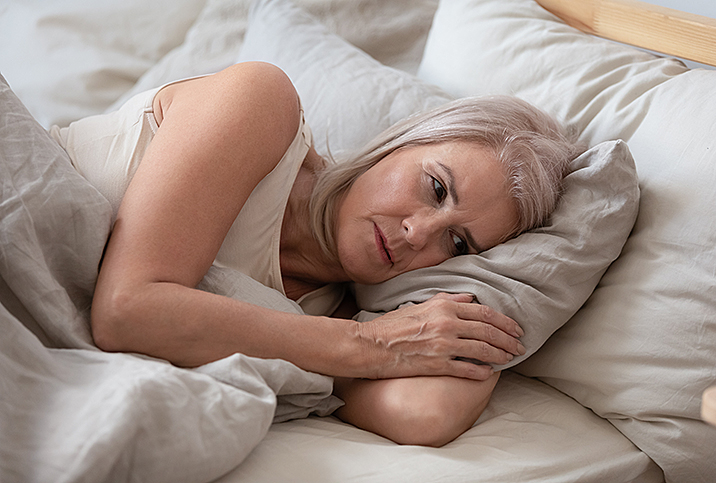Michelle Obama Shares During a Candid Conversation About Menopause

Michelle Obama has opened up about the changes in her body since hitting menopause—and said farewell to her signature sculpted arms.
In an interview previewing her new book, "The Light We Carry: Overcoming in Uncertain Times," the former first lady shared her experience with menopause, a natural process brought on by hormonal changes that signal the end of fertility.
Speaking with People, Obama expressed concern over the stigmatization and lack of information available about menopause.
"There is not a lot of conversation about menopause," she said in the interview posted Nov. 10. "I'm going through it, and I know all of my friends are going through it. And the information is sparse."
In the interview, Obama discussed the changes in her physical abilities.
"Some of it is menopause, some of it is aging," she said. "I find that I cannot push myself as hard as I used to. That doesn't work out for me. That's when I tear a muscle or pull something and then I'm out. The recovery time is not the same."
In response to the changes, Obama has refocused her workout efforts from strength training to flexibility.
"I am still physically active, and my goal now, instead of having 'Michelle Obama arms,' I just want to keep moving," she told People. "You wind up balancing between staying fit enough and being kind enough on your body to stay in the game."
Obama said she has also experienced weight gain, another common symptom of menopause.
"I never used to weigh myself," she said. "I'm not trying to stick to numbers, but when you're in menopause, you have this slow creep that you just don't realize."
Not to mention the hot flashes
This isn't the first time Obama has spoken frankly about the oft-neglected phase of a woman's life. In 2020, a then-56-year-old Obama discussed her experience with hot flashes in "The Michelle Obama Podcast."
"It was like somebody put a furnace in my core and turned it on high," she said.
In the same podcast, Obama revealed that she used hormone therapy to treat her hot flashes.
"I've had to work with hormones, and that's new information that we're learning," she said. "Before, there were studies that said that hormones were bad. That's all we heard. Now we're finding out research is showing that those studies weren't fully complete and that there are benefits to hormone replacement therapy."
Spared from serious mood swings, Obama told People she feels "blessed" by her experience with menopause.
"I think my skin still feels healthy. My hair is still in my head. These are the things that I have to count my blessings for," she said.
What are the symptoms of menopause?
Obama's symptoms—including hot flashes, weight gain and reduced energy—are among the most infamous and common signs of menopause. Obama recently turned 58; most women in the United States experience menopause between the ages of 45 and 55.
During menopause, monthly periods stop, and the body stops ovarian production of estrogen, according to Mary Jane Minkin, MD, a practicing gynecologist and clinical professor in the Department of Obstetrics, Gynecology, and Reproductive Sciences at the Yale University School of Medicine.
"Part of the problem is it's not an on-and-off switch," Minkin said. "It’s not like one day you make estrogen, one day you don't — it's very gradual. And it’s not a smooth decline."
This jagged chemical downswing causes a ripple effect that impacts nearly every part of the body, causing symptoms like hot flashes and weight gain, in addition to mood swings, reduced sex drive, brain fog and insomnia. "Doesn’t that sound like fun?" Minkin quipped.
She noted that every menopause experience is unique, and not all women will share the same symptoms. "For about 20 percent of women, the same hormonal changes are going on, and the women have absolutely no hot flashes whatsoever," she said. "The other 20 percent of us get severe hot flashes and the other 60 percent get somewhere in the middle between nothing and awful."
She noted that while we don’t know why some women suffer worse symptoms than others but do notice symptoms tend to vary by ethnic group. "Even within one country you see significant variability," Minken said. "Within the United States, African-American women seem to have the worst hot flashes, caucasian women the next and women who are of Asian origin the least."
Can hormone therapy help?
As Obama mentioned, there has been some controversy over using hormone replacement therapy (HRT) to treat menopause.
In the 1990s, two major studies reported several risks linked to hormone replacement therapy, including increased risk of heart disease, stroke, blood clots and breast cancer. The studies reported a higher risk for people who begin treatment later than age 60 or more than 10 years after the start of menopause.
However, more recent evidence has challenged the validity of the earlier studies. A 2012 study showed a decreased risk of heart disease in people taking HRT for 10 years if they began immediately after the onset of menopause. Currently, the North American Menopause Society, the American Society for Reproductive Medicine and the Endocrine Society agree that most healthy, newly menopausal women can use hormone therapy for the relief of moderate to severe menopausal symptoms.
"Hormone replacement therapy is an excellent option for many women," confirmed Minkin.
In addition to HRT, lifestyle changes—such as getting enough sleep, recommitting to a healthy diet and finding an exercise routine that works—can help manage menopausal symptoms. For women who experience severe hot flashes at night, Minkin recommended sleeping in a cool room, and to keep an extra pair of dry pajamas next to the bed.
Various supplements are also available that provide a positive benefit for menopause symptoms. Menopause support vitamins by Giddy+HEALTH are a premium women’s formula designed to support the body through menopause with hormone-balancing hormones that can help estrogen functioning through well-studied botanical extracts that are third-party tested, vegetarian, clean-label and free of artificial colors and dyes.
Menopause can be challenging, but—as Obama and Minkin both want to remind everyone—you aren’t alone. Minkin, who operates a site and podcast to help educate women on the changes in their bodies during menopause, said it’s really important for women to talk openly about their experiences with menopause — both with healthcare providers and other women.
"A lot of people are dealing with these things and if they're dealing with them in an individual silo, they're not gonna get much support from their sisters," said Minkin. "You shouldn't be afraid to talk to your friends, because they're probably going through some of this stuff too."
"The other thing that I encourage women to find a healthcare provider that they trust, who will take them seriously and give them options on how to take care of themselves," she added. To find a menopause practitioner in your area, Minkin recommended checking The North American Menopause Society database.


















